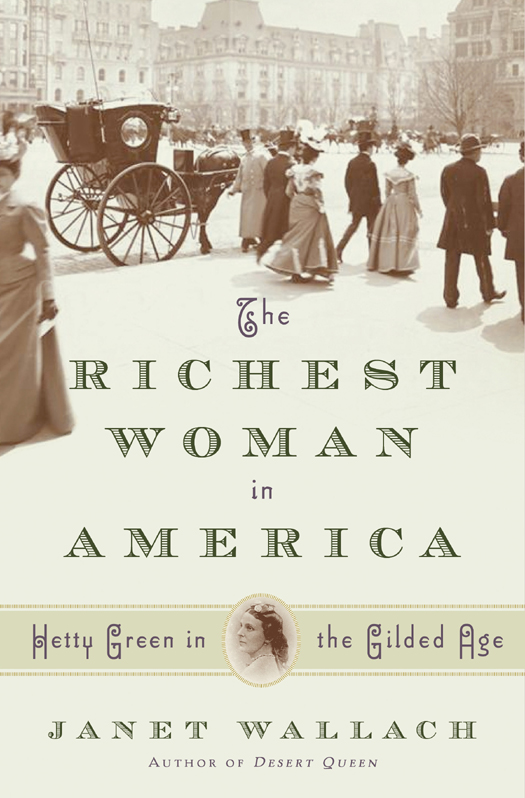
The Richest Woman in America
Hetty Green in the Gilded Age
کتاب های مرتبط
- اطلاعات
- نقد و بررسی
- دیدگاه کاربران
نقد و بررسی

July 23, 2012
Hetty Robinson Green (1834–1916) was as rich as Rockefeller, worth $100 million at her death. Born to an emotionally withholding Quaker family that instilled in her the value of both wealth and thrift, she grew her inheritance into a massive fortune through shrewd investments in greenbacks, struggling railroads, and real estate. Wallach (Desert Queen: The Extraordinary Life of Gertrude Bell) makes a strong case that Green’s Quaker family valued financial shrewdness over physical affection, shaping their daughter into a supremely confident woman who overruled her husband’s and children’s desires for independence and sued business adversaries as a matter of course. Green also defied expectations of a wealthy woman, dressing, eating, and living simply according to her “starched New England values.” Wallach’s enjoyable account encourages admiration for Green’s cheekiness in the face of straitlaced bankers but strains to portray Green as a doting mother and the occasional good friend since her strict frugality and money-related eccentricities required significant compromises from those around her. Still, the author successfully portrays a compelling woman who kept her eyes on the glittering financial prize, using a commonsense philosophy regarding real estate and investment throughout the 19th century’s Wall Street roller-coaster. Agent: Lynn Nesbit.

August 1, 2012
The transporting tale of Hetty Green, who, after being rejected by her parents, learned business from her grandfather and amassed a fortune valued at $100 million in 1916. Wallach (Seraglio, 2003, etc.) frequently points out that Green's methods and philosophy of wealth were remarkably similar to that of Warren Buffett. She particularly notes the many references to her miserliness and how the same qualities were seen as mere eccentricity in men. Her Quaker background taught her how to be independent and make business decisions, and she never wasted her time and especially not her money on the foolishness of the Gilded Age. Green gave freely to charities of her choice but ruthlessly foreclosed when a note was due and unpaid. When her husband needed a bailout from one of his ill-advised speculations, she demanded his properties in return. She always kept a great deal of cash at the ready in order to quickly take advantage of a good buy, and she never bought anything until she had thoroughly investigated every aspect of it. She enjoyed the game of business, especially beating out her rivals. Green emerged from multiple financial disasters--e.g., in 1873, 1893 and 1908--richer than before, always buying as others panicked and selling when prices finally recovered. Her fiscal policies were firm, and she never waivered from them: Never use another's money, never take on a partner, and avoid the pitfalls of leveraging, overborrowing and overspending. The dearth of diaries and personal correspondence available to the author has not prevented her from writing a thoroughly enjoyable biography.
COPYRIGHT(2012) Kirkus Reviews, ALL RIGHTS RESERVED.

September 15, 2012
Investor Hetty Green (1834-1916) came to be known during her lifetime as "the Witch of Wall Street" and later as "the World's Greatest Miser." The image of Green has been rendered more positive and complex recently, e.g., as in Charles Slack's Hetty: The Genius and Madness of America's First Female Tycoon and now in Wallach's contribution. Green amassed an estimated $100 million over her lifetime, but spent many of her years living in boardinghouses, eating soup, and wearing tattered, out-of-date clothing. Wallach (Desert Queen: The Extraordinary Life of Gertrude Bell) argues convincingly that Green's frugality was excessive but understandable for several reasons. The loss of control she experienced when her father died and left much of the already considerable family fortune in the hands of a trust was one factor. Another, learned from the economic downturns of the Gilded Age, was that because fortunes can be lost, money should be saved and invested, not spent profligately. Green's methods were condemned to a great extent simply because she was a strong and canny woman. VERDICT Wallach covers much of the same ground as Slack, so it is unnecessary to own both books, but biography buffs and general readers will learn much from Wallach's engaging study.--Keith Muchowski, New York City Coll. of Technology (CUNY) Lib., Brooklyn
Copyright 2012 Library Journal, LLC Used with permission.

September 15, 2012
Wallach (Desert Queen: The Extraordinary Life of Gertrude Bell, 1996) chronicles the life of another extraordinarily successful, if unconventional, career woman, the legendary Hetty Green. Dubbed the Witch of Wall Street, this nineteenth-century capitalist parlayed her initial inheritance into a substantial fortune, famously eschewing the glamour and the excesses of the Gilded Age. Despite her shrewd investment acumen, her remarkable achievements were often overshadowed by her well-publicized eccentricities. As the mythology of her gratuitous frugality swelled, she was gleefully caricatured in newspapers and magazines as a miser of epic proportions. While she was a popular-culture icon for many of the wrong reasons, most journalists failed to acknowledge her blistering business savvy and the tremendous power she wielded in a male-dominated arena. Wallach does Green long-overdue service by providing an evenhanded account of her professional accomplishments and her personal peculiarities.(Reprinted with permission of Booklist, copyright 2012, American Library Association.)

























دیدگاه کاربران